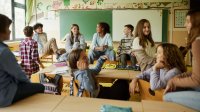Strategies for Supporting Students’ Speaking and Listening Skills
Many students struggle with these skills, which are tied to academic success. Here are a few ways to teach them explicitly.
Many students struggle with speaking and listening skills and the ability to work together in the classroom—vital social skills that are also important in academic learning.
In our district, we noticed a particular decline in speaking and listening skills in response to remote and hybrid learning and subsequently took an intentional, district-wide approach to supporting student discourse that has contributed to significant academic gains.
By facilitating professional development, inviting instructional coaches into our school, selecting curricula that centers student talk, and exploring teaching tools such as sentence starters (e.g., “I agree with you because…,” “Can you tell me more about that...,” and “I know a different way to solve that...”), we promote accountable, respectful dialogue in and outside of the classroom.
If you, too, are looking for specific, systematic steps to get the conversation going in your classroom, here are a few ideas to help get you started.
Create book clubs or literary circles
Pair students based on their interest in a topic, not by their reading levels, and get them talking to each other and the class about the books they enjoy. Provide supports like audio versions of a text if needed, to make the groupings more equitable.
You might ask students to offer a book review upon completing a book, but to do so verbally instead of in written form to boost speaking and listening skills. You can also encourage a question-and-answer session about the book, in which a student reader is considered an expert and is interviewed by their peers to keep the conversation going.
In a recent classroom visit, I saw students involved in literary circles based on student choice. Students chose a book that they found interesting after learning about books during a “book tasting”—an activity in which students walked around the classroom and surveyed information about books that were appropriate for their grade level, presented on different tables.
I returned to the classroom after students dove into the books. The teacher and co-teacher took turns rotating between the groups and asked students open-ended questions about themes and content. The discussion was inspiring, and after teachers posed the initial question, students were able to lead, direct, and continue the conversation organically—an ability that we attribute to the students’ ability to choose the books that they found most compelling.
Get started with Socratic seminars in any subject
To make Socratic seminars dynamic and engaging, you can start by writing open-ended questions on a soccer ball. Then, simply start tossing the ball around the room. The student who catches the ball reads aloud the question that is facing them and responds.
This activity incorporates kinesthetic engagement into the curriculum and works well across subjects. You can find examples of open-ended questions to adapt to your particular unit or lesson topic and write them on the ball. For an added challenge, you might invite students to brainstorm open-ended questions for inclusion in this activity, too, facilitating discussion about what types of questions best support critical thinking and discourse.
Teach about Accountable Talk
Accountable talk is an approach to scaffolding responsible, responsive dialogue in the classroom; often, teachers need to model productive discourse explicitly at first, such as using and talking about insightful open-ended questions or sentence frames, but a gradual release of responsibility can then help students succeed in independent discourse.
Reward students with small incentives when you first roll out accountable talk in the classroom. One teacher in our district uses stickers when he hears students using the accountable talk sentence stems that he displays on his board.
Students can then turn these stickers in for a homework pass when they reach a certain number, incorporating an element of gamification that makes speaking and listening an explicit and continuous consideration in the classroom.
Make it equitable
Even when promoting speaking and listening skills with students, it’s important to ensure that the loudest voices don‘t crowd out the others. Collaborative, group-based, or project-based learning are great ways to spark student conversations in an equitable way.
One way to do this is to make sure that everyone has a role in the group and to explicitly teach kids how to work together. The more students are able to collaborate and practice speaking academically and respectfully with one another, the more natural it becomes for them to have productive discussions.
Rearrange the furniture
Flexible furniture allows teachers to group students in different ways and create comfortable learning environments that lead to conversation. Our State Department of Education is funding classroom redesigns in several schools to support flexibility; some will get desks with built-in whiteboards, and others will have chairs with wheels to help students make small groups. Lego walls and STEM-related items will encourage students to work collaboratively. Search for similar grants or funding opportunities in your district to make flexible seating accessible to all, supporting students’ speaking and listening skills by extension.
